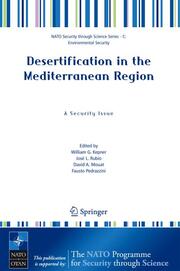Detailansicht
Desertification in the Mediterranean Region
Proceedings of the NATO Mediterranean Dialogue Workshop, held in Valencia, Spain, 2-5 December 2003, A Security Issue , NATO Science for Peace and Security Series C: Environmental Security, Nato Security through Science Series C:
ISBN/EAN: 9781402037580
Umbreit-Nr.: 1573433
Sprache:
Englisch
Umfang: xv, 593 S.
Format in cm:
Einband:
gebundenes Buch
Erschienen am 05.12.2005
Auflage: 1/2005
- Zusatztext
- Desertification in the Mediterranean Region: a Security Issue 1 2 William G. Kepner & José Luis Rubio 1. U.S. Environmental Protection Agency, Office of Research and Development, P.O. Box 93478, Las Vegas, Nevada, USA, 89193-3478 (kepner.william@epa.gov) 2. Centro de Investigaciones sobre Desertificacion-CIDE, (CSIC, Universitat de Valencia, Generalitat Valenciana),Cami de la Marjal, s/n Apartado Oficial, 46470 Albal, Valencia, Spain (jose.l.rubio@uv.es) Security issues related to desertification in the Mediterranean Region were the subject of a special NATO workshop held on 2-5 December 2003 at the Museum of Sciences Principe Felipe in Valencia, Spain. This workshop was organized by the U.S. Environmental Protection Agency (Las Vegas, Nevada, USA), Centre for Desertification Research (Valencia, Spain), and the Desert Research Institute (Reno, Nevada, USA) on behalf of the NATO Science Committee and the NATO Committee on the Challenges of Modern Society (Public Diplomacy Division). Additionally, the European Society for Soil Conservation participated as a collaborating institution. Other participating institutions included the Spanish Ministry of Environment, Generalitat Valencia (Department of Territory and Housing), the Secretariat of the United Nations Convention to Combat Desertification and the City of Art & Sciences of Valencia which hosted the Meeting.
- Kurztext
- Contemporary, i.e. reviews desertification, a worldwide phenomenon of cultural, political, social, economic, and environmental importance affecting one-third of the Earth's surface area and about one-fifth of the human population of the worldProvocative, i.e. opens discussion on a newly emerging concept which seeks to link environmental condition to an evolving definition of security in an attempt to explore likely impacts on the social, economical, and political dimensions of human society throughout the Mediterranean RegionMulti-disciplinary, i.e. includes government diplomats, security specialists, physical and social scientists interested in environmental securityMulti-lateral, i.e. includes participants from the Middle East, North Africa, Europe, and North AmericaComprehensive, i.e. examines environmental and social issues connected to the issue of desertification throughout both the north and south Mediterranean Region
- Autorenportrait
- InhaltsangabePart I. Introduction: Desertification in the Mediterranean Region: Linking Environmental Condition to Security. - Introduction: Desertification and Security.- Perspectives for the Mediterranean Region; W.G. Kepner.- Desertification: A New Security Challenge for the Mediterranean?; H.G. Brauch.- The Poseidon Prairie. Desertification, Environmental. Stress Indicators and the Euro-Mediterranean Space; P.H. Liotta.- Desertification and Environmental Security. The Case of Conflicts between Farmers and Herders in the Arid Environments of the Sahel; S. Tirado.- The Relevance and Consequences of Mediterranean Desertification including Security Aspects; J.L. Rubio, L. Recatala.- Part II. Mediterranean Regional Perspective on Assessment and Condition.- Problematique de la desertification en Algerie: etat et mesures de lutte pour la protection des ressources naturelles; A. Ghazi.- Security impacts of Desertification in Egypt; A.A. Yousef, A. E. Hegazi.-The Challenges of land and water resources degradation in Jordan: diagnosis and solutions; T.M. Abu-Sharar.- Dryland development, desertification & security in the Mediterranean; U.N. Safriel.- State of natural resources degradation in Morocco and plan of actions for desertification and drought control; A. Ouassou et al.- Desertification, territory and people, a holistic approach in the Portuguese context; L.S. Pereira et al.- Migration: an irreversible impact of land degradation in Turkey; S. Kapur et al.- Part III. Assessing Land Use Change Relative to Anthropogenic and Natural Cause.- Does Anthropogenic Activities or Nature Dominate the Shaping of the Landscape in the Oregon Pilot Study Area for 1990-1999?; M.S. Nash et al.- Urban Growth Dynamics (1956-1998) in Mediterranean Coastal Regions: The Case of Alicante, Spain; J.A.P. Aguilar et al.- Land Use Change Detection as a Basis for Analyzing Desertification Processes; A Case Study in Tabernas (Almeria, Spain); T. Alemayehu et al.- Climate Change Land Degradation and Desertification in the Mediterranean Environment; D. De Wrachien et al.- Part IV. Regional Cooperation and Information Sharing.- The Environment and Security Initiative: Transforming Risks into Opportunities for Cooperation; A. Carlsson.- Fostering networking and exchange of information in the Mediterranean region: The MEDCOASTLAND Thematic Network; P. Zdruli et al.- Desertification in the arid and semiarid Mediterranean regions. A food Security Issue; F. Lopez-Bermudez, J. Garcia-Gomez.- Part V. Soil and Vegetation Monitoring.- Monitoring tools to assess vegetation successional regression and predict catastrophic shifts and desertification in Mediterranean rangeland ecosystems; C.L. Alados et al.- Using a GIS for sustainable use and management of an irrigation area in the Spanish - Portuguese border threatened by Desertification; J.M. Nunes et al.- Restoration of Burned Areas in Forest Management Plans; J.A. Alloza, R. Vallejo.- Impact of Forest Fires on Hydrologic Properties of a Typical Mediterranean Forest Soil; O. Gonzalez et al.- The Management of Forest Soils Considering Water Erosion as a Control Factor; M.A. Coutinho, C.R. Antunes.- Part. VI Desertification Indicators and Forecasting Techniques.-Environmentally Sensitive Areas and Indicators of Desertification; C. Kosmas et al.- Desertification in Northern Morocco due to effects of Climate Change on groundwater recharge; S.J.E. van Dijk.- Hydrologic Approach for Assessing Desertification Processes in the Mediterranean Region; I. Pla Sentis.- The Use of Alternative Futures in a Strategy to Assess the Likelihood of Increased Land Degradation Leading to Increased Subsequent Political Instability; D.A. Mouat et al.-
